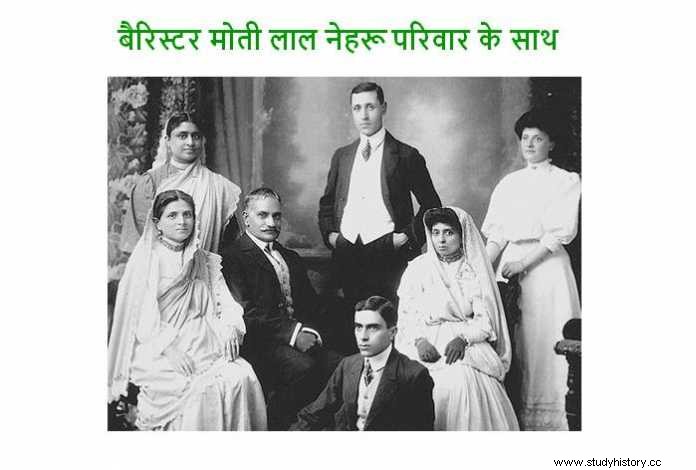
Forced by the ongoing revolutionary movements in India and the activities of the Swaraj Party, in AD 1927, the British government appointed Simon Commission to advise about constitutional reforms in India. All the members of this commission were British. That is why it is also called White Commission. Congress decided to boycott it.
India-Secretary Lord Birkenhead challenged the Indian leaders and said that what is the use of opposing the Simon Commission when the Indians themselves are unable to prepare a constitution which is accepted by all the parties of India! Indian leaders accepted this challenge of the Secretary of India and formed a committee to prepare a proposal for the future constitution of India.
Motilal Nehru was appointed the chairman of the committee and Jawaharlal Nehru was appointed as the secretary. It had 8 members including Subhash Chandra Bose and Sir Tej Bahadur Sapru. The report presented by this committee is called the Nehru Report. In this report, the establishment of responsible government in India, declaration of rights to protect the religious and cultural interests of minorities and adult suffrage etc. were included.
In the all-party meeting in December 1928, Jinnah placed three amendments on the proposals of the Nehru Committee, but they were not accepted. The Muslim League under the leadership of Muhammad Shafi boycotted the Nehru Committee from the very beginning. On 31 December 1928 and 1 January 1929, a meeting of the All Party Muslim Conference was called in Delhi under the chairmanship of Aga Khan.
In this, resolutions were passed against all the proposals of the Nehru Report. Jinnah did not participate in this conference, but he made a resolution in the session of the Muslim League in March 1929 in which 14 conditions were laid against the Nehru Report. The conditions related to the Muslim community were as follows-
(1) The future constitution should be federal and the remaining power should be exercised by the provinces.
(2) A measure of self-government should be accepted for all the provinces.
(3) All the legislatures of the country and other elected parties should be reconstituted on a certain principle which should represent the dominant minority community in each province.
(4) Muslim representation at the center should not be less than one third.
(5) Representation should be based on communal election system.
(6) No territorial redistribution in Punjab, Bengal, Uttar Pradesh and Border Provinces should affect the Muslim majority.
(7) There should be complete religious freedom, if 3/4 members of any community protest then that bill should not be passed.
(8) Sindh should be separated from Bombay.
(9) Equal rights should be given in North-West Frontier Province and Balochistan as in other provinces.
(10) There should be freedom for open advocacy for the upliftment and protection of Muslim culture, religion, private law, Muslim education and language.
(11) Muslims should get protection in government jobs.
(12) The number of Muslim ministers in the central and provincial governments should be 1/3.
(13) The constitution should not be changed without the approval of the units.
(14) Separate voting system should not be abolished without Muslim approval.
In the Nehru Report, except Jinnah's demand numbers 1, 12 and 13, the remaining 11 demands were already accepted, but Jinnah was not satisfied with them. On the other hand, the Hindu Mahasabha also did not accept many proposals of the Nehru Committee, especially the proposal to separate Sindh from Bombay.
Shahnawaz Bhutto, Muhammad Ali Jinnah and Sir Ghulam Hussain wanted Sindh to be separated from Bombay but Lala Lajpat Rai and Harchandrai wanted to keep Sindh with Bombay so that a Muslim majority province could not emerge as a separate Sindh region. . Organizations like All India Hindu Mahasabha, All India Congress Committee, Sindh Hindu Panchayat etc. opposed the proposal of segregation.
The Hindu Mahasabha alleged that in order to appease the Muslims, in the Nehru Report, proposals were made injurious to the Hindus. Thus being rejected by both Hindus and Muslims, this report could not acquire more importance than being dumped in the garbage.
.....continuously (2)
